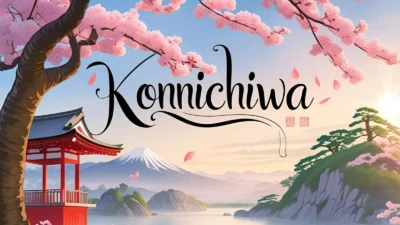If you want to learn how to say hi in French, you’re in the right place. Greeting people politely is an important part of French culture, and knowing the right words makes your conversations friendly and natural. In this guide, you’ll learn the common phrases, how to pronounce them, and when to use each one so you can greet people confidently in any situation.
Learning how to say hi in French is a great way to start conversations and show politeness in any French-speaking setting. The most common greeting is “Bonjour”, which means “Good day” and can be used in both formal and informal situations.
Say Hi in French
In this guide, you’ll discover 15 different ways to say hi in French — complete with examples and explanations — so you can greet others with confidence whether you’re in Paris, Montreal, or anywhere in the Francophone world! 🇫🇷
1. Bonjour (Hello / Good day)
Origin:
From bon (good) and jour (day). Used in both formal and informal daytime situations.
Example:
👤 User A: Bonjour, Madame Dupont.
👤 User B: Bonjour! Comment allez-vous ?
Use: Most common and polite way to greet someone during the day.
2. Salut (Hi / Hey)

Origin:
Derived from Latin salutare, meaning “to greet.” Informal and friendly.
Example:
👤 User A: Salut, ça va ?
👤 User B: Salut! Oui, et toi ?
Use: Casual; used among friends, peers, or young people.
3. Coucou (Hey there / Peekaboo!)
Origin:
Originally a baby talk expression like “peekaboo,” coucou evolved into a playful adult greeting.
Example:
👤 User A: Coucou, tu es là ?
👤 User B: Coucou ! Je t’attendais.
Use: Very informal, cute, often used in texts or between close friends or couples.
4. Allô (Hello – on the phone)
Origin:
Borrowed from English “hello,” this is the standard French phone greeting.
Example:
👤 User A: Allô ?
👤 User B: Allô, c’est moi. Tu m’entends ?
Use: Only used on the phone—not in face-to-face situations.
5. Rebonjour (Hello again)
Origin:
A polite and slightly humorous way to say hello again after already greeting someone earlier.
Example:
👤 User A: Rebonjour ! On se retrouve encore.
👤 User B: Oui, quelle coïncidence !
Use: Casual; used when you see someone again on the same day.
6. Bonsoir (Good evening)

Origin:
From bon (good) and soir (evening). Used after about 6 p.m.
Example:
👤 User A: Bonsoir, Monsieur.
👤 User B: Bonsoir, enchanté.
Use: Polite and formal evening greeting.
7. Ça va ? (How’s it going?)
Origin:
Short for Ça va bien ? (Are things going well?). Now often used as both a greeting and question.
Example:
👤 User A: Salut, ça va ?
👤 User B: Ça va bien, merci ! Et toi ?
Use: Informal, but very commonly used even with people you don’t know well.
8. Yo (Yo)
Origin:
Borrowed from English youth slang, yo is sometimes used among French teens or in urban culture.
Example:
👤 User A: Yo mec, tu viens ce soir ?
👤 User B: Yo, carrément !
Use: Very informal and modern; used mostly in youth or street culture.
9. Enchanté(e) (Pleased to meet you)
Origin:
Literally means “enchanted,” this is a charming and traditional way to greet someone you’ve just met.
Example:
👤 User A: Bonjour, je suis Julien.
👤 User B: Enchantée, moi c’est Sophie.
Use: Formal or semi-formal first-time meetings.
10. Quoi de neuf ? (What’s new?)
Origin:
Direct translation of “what’s new?”—used for casual catch-ups.
Example:
👤 User A: Salut ! Quoi de neuf ?
👤 User B: Pas grand-chose, et toi ?
Use: Informal; great for friends or casual conversations.
11. La forme ? (All good? / You good?)

Origin:
Shortened from Tu es en forme ? meaning “Are you in good shape?”
Example:
👤 User A: Salut, la forme ?
👤 User B: Ouais, super ! Et toi ?
Use: Casual, sporty tone; often used among young people.
12. Yoho (Hey!)
Origin:
A playful, sing-song greeting sometimes used in pop culture or joking settings.
Example:
👤 User A: Yoho, les amis !
👤 User B: Yoho ! Qu’est-ce qu’on fait ce soir ?
Use: Very informal and often used humorously or in groups.
13. Bien le bonjour ! (A hearty hello!)
Origin:
An old-fashioned but playful twist on bonjour, sometimes used theatrically or in writing.
Example:
👤 User A: Bien le bonjour, cher voisin !
👤 User B: Et à vous aussi !
Use: Used humorously or to sound grandiose or literary.
14. Hey (Hey)
Origin:
Direct borrowing from English, now common in texts or casual conversation in French pop culture.
Example:
👤 User A: Hey, t’es dispo ce soir ?
👤 User B: Hey, ouais pourquoi ?
Use: Informal; especially in texting or among younger people.
15. Bonjour tout le monde ! (Hello everyone!)
Origin:
Used to greet a group. Combines bonjour with tout le monde (everyone).
Example:
👤 User A: Bonjour tout le monde !
👤 User B: Salut ! Bienvenue à la réunion.
Use: Polite group greeting—perfect for classrooms, meetings, or online forums.
FAQs
- What is the most common way to say hi in French?
The most common greeting is “Bonjour”, used during the day. - How do you say hi casually in French?
Friends or peers often say “Salut”, which is informal and friendly. - Can you say hi in the evening in French?
Yes — “Bonsoir” is used as a greeting in the evening. - Is there a formal way to greet someone in French?
Yes — “Bonjour” or “Bonsoir” with proper manners is formal and polite. - Can you use hi in text messages in French?
Yes — “Salut” is common in casual texts or online chats. - Do you need to do anything else when greeting someone in France?
Yes — a handshake, hug, or cheek kiss may accompany greetings, depending on the relationship and context. - Can greetings vary by region in France?
Yes — some regions have unique expressions or local variations, but “Bonjour” and “Salut” are widely understood.
Conclousion:
Now you know how to say hi in French using a variety of greetings for different situations — from casual chats to formal meetings. Whether it’s a simple “Salut!” or a polite “Bonjour!”, each phrase helps you connect more naturally with French speakers.Mastering these greetings not only boosts your confidence but also shows cultural respect. So go ahead and greet the world in French — one “hi” at a time!
With just a few words, you can make a warm first impression and start conversations with ease.



